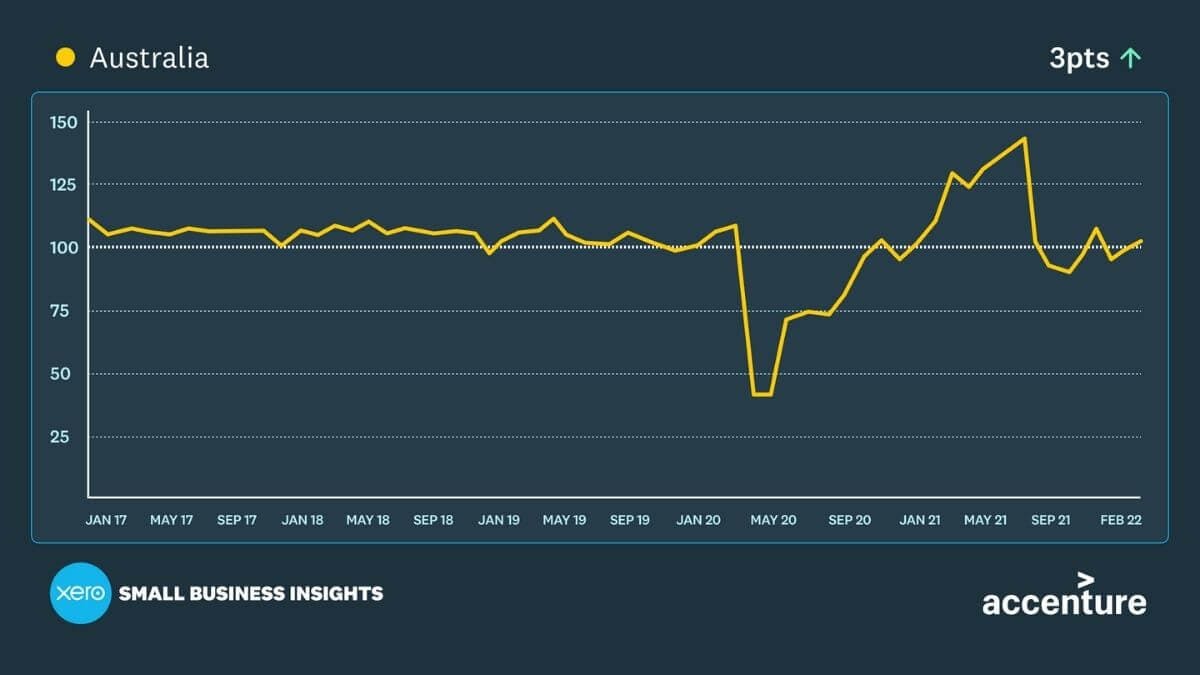According to the most recent Xero data on the health of Australia’s small business economy in February, small business performance is gradually improving after a difficult summer, with a slow return to above the long-term average.
In February 2022, the Index increased by three points to 102.
The result was largely driven by sales, which rose 15.2 per cent year-on-year (y/y) and was partially offset by continued weakness in jobs growth, which fell 1.1 per cent y/y in February after a 0.6 per cent y/y rise in January.
Consistent with the Index data’s positive sales growth, more than half of the small businesses surveyed (53 per cent) said they were performing about the same as before the pandemic.
“February’s Xero Small Business Index results are cause for cautious optimism that the sector is on track for a gradual recovery,” said Joseph Lyons, Managing Director Australia and Asia, Xero.
“That said, small businesses are still navigating the ongoing impacts of the pandemic and continued labour shortages, while also facing a fresh set of challenges in 2022. Those in southeast Queensland and northern New South Wales are dealing with the aftermath of the floods, while more broadly we’re seeing the effects of inflation and rising costs.
“Time and again, small businesses have proved their resilience, but they’ll need to remain top of mind for political parties this budget week and as we edge closer to an election. The health of the small business sector is key to our sustained economic growth,” said Lyons.
An air of optimism
The new findings arrive in the same week as the budget announcement, as small businesses assess the policies that are important to them, their businesses, and their recovery.
According to a recent Xero survey, while 32 per cent of small businesses still see COVID-19 as a threat this year, they are optimistic that conditions will be better than in previous years.
In addition, the Index’s return to long-term above average (100 points) is a positive sign for small businesses.
Employment woes continue
Despite the rise in the Index, job growth was weaker in February, falling 1.1 per cent year on year. Jobs were lower in all states, including Western Australia, than they were in February 2021, falling by 1.1 per cent year on year – the state’s first decline since June 2020, after largely avoiding the worst of the pandemic. Victoria was the best-performing state, with year-on-year job losses of only 0.2 per cent.
Administrative services (+3.5% y/y) and professional services (+2.6%) were the best performing job sectors, while the pandemic caused job losses in industries such as hospitality (-4.8% y/y) and retail (-1.1% y/y). Education and training was the weakest sector (-7.8 per cent year on year), and it is still feeling the effects of the recession.
February saw Victoria lead with the strongest sales growth at (+18.2% y/y), followed by Western Australia (+17.5% y/y) – despite the rise in COVID cases.
Wages hold onto recent gains
Wages rose 3.3 per cent y/y in February, and are little changed from the 3.4 per cent growth recorded in January. Hospitality recorded a 4.0 per cent y/y rise in wages as this sector continues to struggle to attract staff. The slowest wages growth is in health and arts & recreation, both at 2.8 per cent y/y.
“Wage growth is slowly picking up, underpinned by strong demand from employers. This is likely to continue in the months ahead, as recent strong sales growth continues to support the need for more staff in small businesses,” said Louise Southall, Xero Economist.
To download the full February results, including industry and regional breakdowns, go to the website here.
To find out more about how the Xero Small Business Index is constructed, see the background information and methodology.
Keep up to date with our stories on LinkedIn, Twitter, Facebook and Instagram.

